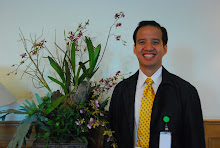
As I have been wont to do in a brother blog (i-swipemo.blogspot.com), I frequently take relevant material from the New York Times and post it with my commentary as cover. And the matter discussed below is no different.
It has taken me several years to put off the resentment for the increasing "dependency" (if I may call it that) of my parents. I thought at first it was because I was just selfish, refusing to carry my own load of work around the house, but lately, I have have begun to realize that I resent the responsibility because it was an acceptance that my parents not as young as I want them to remain to be. We have long passed the point where they were the primary care-givers - I should have been more perceptive, especially after my dad's mild stroke, his insulin dependency, and his then frequent visits to the hospital for mild pneumonia. My mom isn't as sprightly as I have always imagined her to be: frequent drives now tire her easily and she is now more prone to colds and cough. Funny, we have always fought for the right to be treated as an adult by our parents but when the tables are turned, it becomes just as big a struggle to assume the mantle.
Now I understand why a friend in Culver was reading up on caring for geriatric parents even when he was still in high school. I hope to learn as much in time to meet my parents' needs.
More Men Take the Lead Role in Caring for Elderly Parents
By JOHN LELAND
When Peter Nicholson’s mother suffered a series of strokes last winter, he did something women have done for generations: he quit his job and moved into her West Hollywood home to care for her full time.
Since then, he has lost 45 pounds and developed anemia, in part because of the stress, and he is running out of money. But the hardest adjustment, Mr. Nicholson said, has been the emotional toll.
“The single toughest moment was when she said to me, ‘And now who are you?’ ” he said. “My whole world just dropped. That was the pinnacle of despair.”
Mr. Nicholson, 53, is part of a growing number of men who are providing primary care for their aging parents, usually their mothers.
The Alzheimer’s Association and the National Alliance for Caregiving estimate that men make up nearly 40 percent of family care providers now, up from 19 percent in a 1996 study by the Alzheimer’s Association. About 17 million men are caring for an adult.
“It used to be that when men said, ‘I’ll always take care of my mother,’ it meant, ‘My wife will always take care of my mother,’ ” said Carol Levine, director of the families and health care project at the United Hospital Fund. “But now, more and more men are doing it.”
Often they are overshadowed by their female counterparts and faced with employers, friends, support organizations and sometimes even parents who view caregiving as an essentially female role. Male caregivers are more likely to say they feel unprepared for the role and become socially isolated, and less likely to ask for help.
Women still provide the bulk of family care, especially intimate tasks like bathing and dressing. At support groups, which are predominantly made up of women, many women complain that their brothers are treated like heroes just for showing up.
But with smaller families and more women working full-time, many men have no choice but to take on roles that would have been alien to their fathers. Just as fatherhood became more hands-on in the baby boom generation, so has the role for many sons as their generation’s parents age.
Mr. Nicholson said his family had not discussed who would take care of his mother, Bernice, if she became frail. But as the unmarried child among his two siblings, and the one who was most readily available, he had spent increasing time with her as she aged.
Still, he was not prepared for the isolation of full-time care. “There’s absolutely no involvement in the outside world,” Mr. Nicholson said. “When I finally get out to a Dodgers game, walking to the car, I say, Oh, this is what life is about. I forgot about this. I can’t be doing myself any good by not getting out of here.”
Isolation affects women as well, but men tend to have fewer lifelines, said Donna Benton, an assistant research professor of gerontology at the University of Southern California and director of the Los Angeles Caregiver Resource Network. Men are less likely to have friends going through similar experiences, and depend more on their jobs for daily human contact.
“That’s the harder part for men, to find someone to talk to,” Dr. Benton said. “It’s the emotional side: the guilt, the sadness, the anger. For men it becomes more stressful because they can’t talk about it. They feel cut off.”
And then there is the inevitable question: What happens when I have to bathe her?
“That’s where the rubber meets the road,” said Donna Wagner, the director of gerontology at Towson University and one of the few researchers who has studied sons as caregivers.
For Mr. Nicholson, the whole experience has been a journey into the surreal, but especially at bath time.
Though he is not squeamish about it, he said: “The weirdness permeates our relationship. She doesn’t know if I’m her husband or her boyfriend or her neighbor. She knows she trusts me. But there are times when it’s very difficult. I need to keep her from embarrassing herself. She’ll say things like, ‘I adore you.’ I don’t know who she’s loving, because she doesn’t know who I am. Maybe I’m embarrassed about it — it’s my mom, for Christ sakes. But it’s weird how the oldest son becomes the spouse.”
Matt Kassin, 51, said he had no role model for male caregiver in his family. His father had been distant; he, in turn, had been the rebellious son.
“I was the son who went through divorce, who needed to separate from my mom when I was teenager,” Mr. Kassin said. “I’m the son that wanted distance. Now I’m the son who hears every morning, ‘It’s so nice to hear your voice.’ ”
On a recent evening, Mr. Kassin visited his mother, Doris Golden, in her Manhattan apartment. Ms. Golden, 82, is in the early stages of Alzheimer’s and still lives independently, but relies on Mr. Kassin to arrange her schedule, pay her bills and make sure she remembers her daily tasks (his sister also helps).
His care has surprised his mother. “When he was young, I couldn’t get him to raise a finger,” Ms. Golden said. Her conversation looped repeatedly back to this point, and with each return, Mr. Kassin grew more irritated. That was when he was a teenager, he said, sharply; hadn’t he been more attentive since?
Finally she looked at him tenderly and asked, “When did I start relying on you?”
Interviewed apart from his mother, Mr. Kassin said: “It’s kind of like living my nightmare situation. But it’s a great opportunity here. Here’s the woman who nurtured me. She now is the child. You worry if you’re up for the challenge. If I don’t make this challenge, what kind of human being am I?”
In past generations, men might have answered this question by pointing to their accomplishments as breadwinners or fathers. Now, some men say they worry about the conflict between caring for their parents and these other roles.
In a 2003 study at three Fortune 500 companies, Dr. Wagner found that men were less likely to use employee-assistance programs for caregivers because they feared it would be held against them.
“Even though the company has endorsed the program, your supervisors may have a different opinion,” Dr. Wagner said. “I had a man who worked for a large company with very generous benefits, and he was told that if he took more time to go with his dad to chemotherapy, he was at risk of losing his job. He ended up not going with his father.”
Mr. Kassin said that although his employer had been understanding, he was reluctant to talk about his caregiving because “I think it would be looked at like, when they hire a male, they expect him to be 100-percent focused.”
“I don’t want to appear to be someone who has distractions that detract from performance,” he said.
For many men, the new role means giving up their self-image as experts, said Louis Colbert, director of the office of services for the aging in Delaware County, Pa., who has shared care of his 84-year-old mother with his siblings since her Alzheimer’s made it necessary.
“I’ve been a professional for 32 years,” Mr. Colbert said, “but yet I remember the first time I was driving to my mother’s house, being afraid because I didn’t know if I knew what to do.”
Once a year, Mr. Colbert organizes a get-together for male caregivers. The concerns they raise, he said, are different from those of women in support groups. “Very clearly, they said they wanted their role as caregiver validated, because in our society, as a whole, men as caregivers have been invisible,” he said.
This invisibility can extend to hospitals and nursing homes, said Amy Torres, helpline director at Fria, a national nonprofit organization based in New York that represents family members and residents in long-term care facilities.
“Nursing homes have a very difficult time dealing with male caregivers,” Ms. Torres said. “It’s unusual for them. The male caregiver is made to feel their interest in their relative is inappropriate. Our male callers say they’re made to feel what they’re doing is unusual, that it’s wrong.”
She gave the example of a son who was the health care agent for his mother and wanted to be in the room when the staff changed her diaper because he was concerned about her skin condition. “The staff refused to allow it,” Ms. Torres said. “They said the mother’s dignity was at risk.”
After two weeks of pressing, she said, he finally got his way. With a daughter, this would not have been an issue, Ms. Torres said.
And even when they are acknowledged, for many male caregivers, as for women, there is the lingering sense that whatever they do is not enough.
Mr. Nicholson said he knew this feeling too well. As a teacher, he could measure his contribution by the students’ progress. But with his mother, he can only watch her decline.
“I’m always asking myself, Am I even qualified for this?” he said. “Just because I love her a lot doesn’t mean that I have any idea if I’m doing the right thing, or doing what’s best for her.”
He sounded exhausted, rattled even.
“I don’t know if this is just the musings of someone who’s on the verge of tossing everything and putting her in a home,” he said. “But this is a very revealing journey about who I am to me and my family, and what’s important to me.”





No comments:
Post a Comment